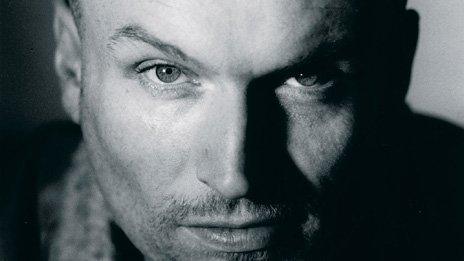Mark Ravenhill: 'Maybe I'm not the right person to write Doctor Who'
- Published

Ravenhill is spending at least two years as the RSC's writer in residence
Mark Ravenhill's version of Bertolt Brecht's A Life of Galileo has been getting strong reviews since it opened last week at the Swan Theatre in Stratford-upon-Avon.
The play stars Ian McDiarmid as the 17th Century scientific genius who challenged the Church with his assertion that the Earth orbits the Sun.
As the Royal Shakespeare Company's writer in residence, Ravenhill's second RSC play commission is a new work inspired by Voltaire's Candide.
As part of his residency last year, Ravenhill wrote a sonnet for Shakespeare's birthday. This year he plans to write a "sonnet cycle" to mark the 400th anniversary of the Globe theatre burning down in 1613.
In this Q&A, Ravenhill talks about translating Brecht, his London Marathon training and how Doctor Who helped influence his career as a writer.
What was it like when you started as the RSC's writer in residence?
The first few months is working out who everybody is and how to get hold of somebody - it is an art in itself. And then learning how to make the system work for you. In these big theatre machines it's very easy for your particular project just to become another sausage coming out of the factory.
Has the residency changed your writing?
Every experience you have inevitably changes what you write. It's only often years later that you can absolutely pinpoint it.
Certainly the Candide I've written is a response to what I've experienced while I've been here.
What has the RSC got out of having you around?
I think the RSC likes me to be around because I do ask questions and I do challenge things and I do question some of the assumptions of what we're doing.
I think those that didn't know me - those who were expecting somebody very truculent and aggressive - have been pleasantly surprised to find that I'm on the team.
Your latest RSC play is your version of Brecht's A Life of Galileo. Why that play, and why Brecht?
I've always loved Brecht since I started reading masses of plays at university. The Brecht plays seemed to be very alive and present in the way that a lot of the plays that I was reading weren't. He's got a huge range.
He was first championed as a political playwright - and he is - but the English read into that sackcloth and wholemeal bread and clogs.
But actually there's a great springiness and wit in Brecht's language which I think we've overlooked.
What other projects to do have beyond the RSC?
How long have you got? This year for the 100th anniversary of Benjamin Britten I've composed some cabaret songs with Conor Mitchell which complement the Britten Auden cabaret songs. I've made a documentary film with [drag queen, actor and activist] Bette Bourne based on a stage show we did together talking to him about his life. And I've written a libretto for a grand opera for the Norwegian National Opera.
And you're also training for the London Marathon?
I'm running for a charity called Theatre for a Change who do work with HIV prevention in Ghana and Malawi. I've been training since June and I've got up to running 15 miles and working up to the 26 miles on 21 April.
Is running good for a writer?
I really enjoy the space that you have, just a few hours to yourself. It's very hard to have negative thoughts when I'm running, it tends to be very creative thought. I normally solve problems with scenes.
Candide is mostly in rhyming couplets and I think that's partly the influence of that beat of pounding the streets.
You're a long-standing fan of Doctor Who. Have you dropped hints to Doctor Who boss Steven Moffat that you'd like to write for the show?
I did once go and see [former Doctor Who boss] Russell T Davies and he said he thought I was far too adult for Doctor Who. But he was creating [Doctor Who spin-off] Torchwood and so he said to go away and come up with some ideas. I had very few clues what it was about, so it was like throwing darts at a dartboard in the dark.
That was the closest I ever came. Although I love Doctor Who - maybe I'm not the right person to write it.
How long have you been a fan?
Forever. My first memory is having a playground conversation in 1973 about the Jon Pertwee story, Carnival of Monsters.
I went to the first convention and Tom Baker was there with [writer and script editor] Robert Holmes.
I asked Robert Holmes how he solved the dramatic problem of writing an episode where the Doctor doesn't have a companion. So even then I must have had some sort of interest in the writing process!
So did Doctor Who lead to you becoming a writer in some way?
Yes. Television in those days didn't really have any sense of revealing its own production process, it just existed in the moment. But there was a book called The Making of Doctor Who that came out in 1973 that showed me how scripts were laid out and explained what a read-through was.
How do you sum up your last year of being a writer in residence at the RSC?
It's great to feel part of something and to be able to have conversations with people who are doing the same thing as you, but who have completely different ideas of where you're heading. Being part of this team is really satisfying.
A Life of Galileo runs at The Swan Theatre, RSC Stratford, until 30 March.
- Published13 February 2013
- Published30 November 2011